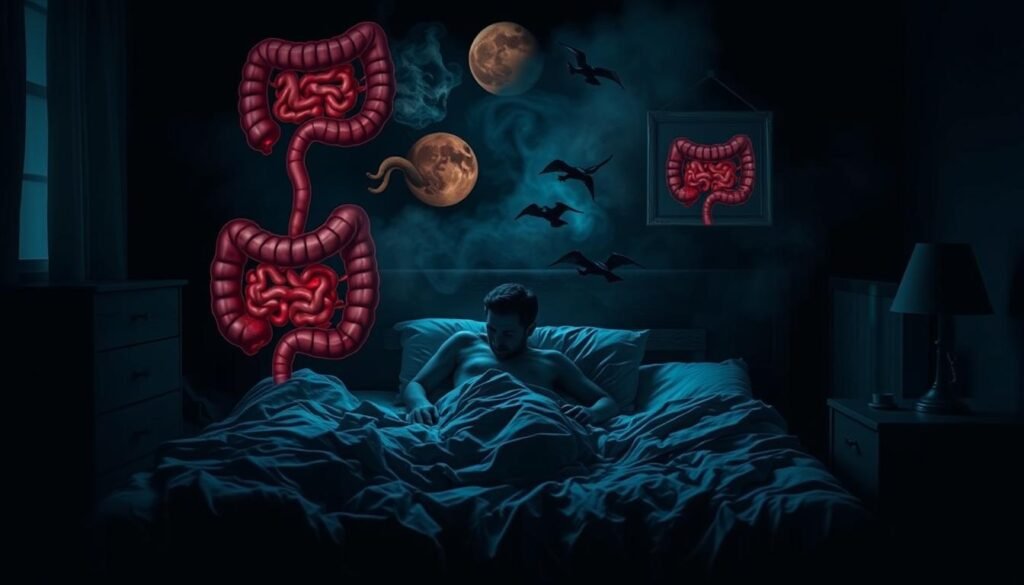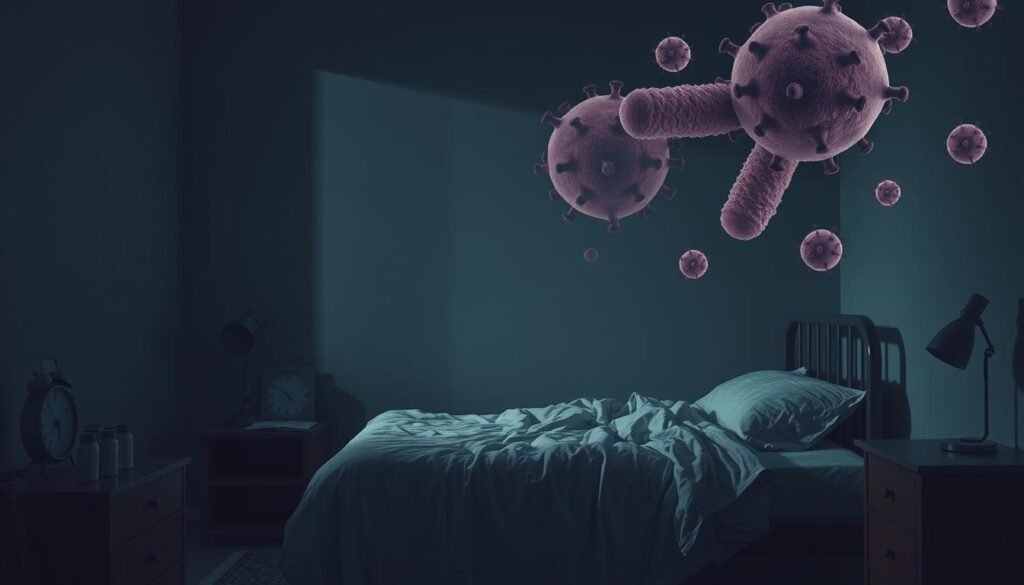Did you know about 70% of people with colorectal cancer have trouble sleeping? This fact highlights an important but often ignored aspect of cancer care. It shows how colon cancer and sleep problems like insomnia are related. For those going through cancer, knowing how it affects sleep is very important.
We will look into if colon cancer can actually cause insomnia. We’ll talk about how symptoms of colon cancer might make it hard to sleep. We’ll also look into how insomnia shows up in those dealing with this illness. By understanding the connection between cancer, its treatment side effects, and sleep disorders, readers will get a better idea of how to handle these issues.
Key Takeaways
- 70% of colorectal cancer patients experience sleep problems.
- Rectal cancer patients report sleep issues at a significantly higher rate than those with colon cancer.
- Common side effects of colon cancer include insomnia, nausea, and cognitive disturbances.
- Coping strategies for insomnia involve lifestyle adjustments and seeking support.
- Understanding the causes of sleep disturbances is essential for effective management.
Understanding Insomnia in Cancer Patients
Sleep issues are very common in people with cancer. Many studies show that cancer patients often struggle to sleep. The link between cancer and sleeping problems can come from stress and side effects of treatments.
Prevalence of Sleep Issues Among Cancer Patients
Between 30% to 75% of cancer patients report having trouble sleeping. This affects their quality of life. Pain, medication, and anxiety play big roles in causing sleep problems.
Relationship Between Diagnoses and Sleep Disturbances
Different cancers and treatments disturb sleep in different ways. Chemotherapy and hormonal treatments change sleep habits. Cancer symptoms like pain and stomach problems also make sleep hard.
Feelings of anxiety and depression from a cancer diagnosis worsen sleep issues. Understanding these problems helps doctors provide better care for their patients.
Colon Cancer Symptoms Impacting Sleep Quality
Sleep quality often declines in those with colon cancer. Colon cancer symptoms can greatly interrupt good sleep. Understanding how these symptoms affect sleep is crucial for improving patient health.
Common Symptoms that Disrupt Sleep
Many with colon cancer report symptoms that harm their sleep. These key symptoms are:
- Abdominal pain: This discomfort makes finding a comfy sleep position hard.
- Fatigue: Extreme tiredness leads to inconsistent sleep patterns and insomnia.
- Digestive issues: Problems like constipation or diarrhea cause nighttime wake-ups, harming sleep quality.
Studies show a strong link between colon cancer symptoms and sleep problems. Research finds that 30% to 93% of cancer patients experience sleep disturbances. This highlights the need for effective symptom management.
The Role of Pain in Sleep Disturbances
Pain significantly disrupts sleep for those with colon cancer. It can cause:
- Difficulty falling asleep: Pain can make it hard to start sleeping, leading to fatigue.
- Frequent awakenings: Pain often wakes patients up, reducing sleep quality.
- Reduced sleep duration: Pain and discomfort can cut down total sleep time.
It’s key to understand how pain influences sleep. Managing pain and improving sleep can boost life quality. Studies link sleep problems with fatigue in colorectal cancer survivors. These show important connections between sleep and health. For more information, visit this link.

The Link Between Cancer and Sleep Disorders
It’s very important to understand how cancer and sleep disorders are connected. This knowledge can help improve life quality for many patients. Anxiety and depression are common in those diagnosed with cancer. They often lead to sleep issues, making things even tougher. Sleep troubles due to the psychological impact of colon cancer, like anxiety, can lead to insomnia.
Impact of Anxiety and Depression on Sleep
Anxiety and sleep affect each other in a cycle. More anxiety can make sleep hard, and not sleeping well can make anxiety worse. Cancer patients often feel stressed, which can make it hard to sleep well. It’s been shown that the stress from colon cancer plays a big role in sleep problems. So, helping cancer patients with their mental health is key.
Sleep Disorders Associated with Cancer Treatments
Cancer treatments like chemo and radiation add to sleep problems. Side effects such as tiredness, nausea, and pain hurt sleep quality. Also, the stress from treatment can cause anxiety and insomnia. Conditions like sleep apnea and insomnia make everything harder for people getting cancer treatment. This means sleep issues should be seriously addressed as part of total care.

Does Colon Cancer Cause Insomnia?
The link between colon cancer and insomnia worries many people. Studies point out clear patterns of sleep problems in those with colon cancer. Many cancer patients struggle with sleep, showing how widespread insomnia is.
Research Findings on Sleep Disruptions in Colon Cancer Patients
About 70% of those with colorectal cancer face sleep trouble. Symptoms of cancer, treatment effects, and emotional stress cause this. Especially, rectal cancer patients often have worse sleep problems. They find it hard to fall asleep, stay asleep, or keep waking up. This leads many to wonder if colon cancer causes insomnia.
Types of Insomnia Reported Among Colon Cancer Patients
Colon cancer patients experience different insomnia types. Some have short-term insomnia, which lasts a few nights or weeks. Others suffer from chronic insomnia, lasting more than three months. Pain from cancer, anxiety, and treatment issues worsen sleep. These sleep issues make patients feel very tired and unhappy, showing the need to fix them.

Side Effects of Colon Cancer Treatment Affecting Sleep
The journey to treat colon cancer can make sleeping hard. It’s important to know how these treatments affect sleep. Patients often say sleeping problems are a big worry. This issue can last well beyond the end of their treatment.
Chemotherapy and Its Influence on Sleep Patterns
Chemotherapy deeply affects sleep. Many patients, almost half, feel very tired because of it. This tiredness can make it hard to sleep. It might last for months or even a year or two after treatment.
Symptoms like nausea and night sweats also lead to poor sleep. To sleep better, it helps to have a calm bedtime routine. This includes a steady sleep schedule and relaxing before bed. For tips on better sleep, check out healthy sleep hygiene practices.
Radiation Therapy and Sleep Challenges
Radiation therapy brings its own sleep problems. Issues like anxiety and discomfort during treatment cause trouble sleeping. Studies show that 30-50% of patients face these issues.
Understanding these effects helps patients manage them better. Good sleep is key to recovering well. Eating well and staying active can also help fight off treatment fatigue.
Managing Cancer-Related Insomnia
Many cancer patients struggle with insomnia, affecting their well-being. It’s vital to tackle this issue. Nearly 40% of cancer survivors deal with sleep problems up to five years after diagnosis. Finding ways to improve sleep quality is essential for their health and happiness.
Effective Strategies for Improving Sleep Quality
Some techniques are especially helpful for managing cancer-related insomnia:
- Cognitive Behavioral Therapy (CBT): This therapy helps patients change negative sleep thoughts into positive ones. It encourages better bedtime habits.
- Establishing Sleep Hygiene: Making a restful bedtime environment and sticking to a sleep schedule improves sleep. It’s important to avoid caffeine in the evening since it disrupts sleep for up to six hours.
- Relaxation Techniques: Methods like meditation, acupuncture, and deep breathing can lessen stress. This makes it easier to sleep.
- Medication Adjustments: Talking with doctors about sleep aids, like melatonin or prescribed drugs, helps. Some find medical marijuana gummies useful for insomnia.
- Exercise and Activity: Being active during the day supports better sleep at night. Regular exercise or yoga has been beneficial for some people.
The Role of Healthcare Providers in Sleep Management
Healthcare providers are key in handling cancer-related insomnia. Open conversations and customized sleep plans meet individual needs. For example, a sleep diary can help track sleep patterns and identify issues. Oncologists might prescribe sleep aids to ease anxiety and improve sleep, showing the need for a well-rounded approach.
With these strategies and support from healthcare providers, cancer patients can combat insomnia. They can find hope and comfort. For more info and advice on managing sleep issues with cancer, you can check out this resource.
Colon Cancer Pain and Sleep: The Complicated Relationship
Understanding the link between colon cancer pain and sleep is tricky. It’s important to know how pain affects sleep. That way, we can make overall health better. Pain can really stop a good night’s sleep, creating a cycle of discomfort and tiredness. Many people with colon cancer have more pain. This can break up their sleep and make it hard to rest well.
How Pain Affects Sleep Quality
Colon cancer pain can mess up not just the length of sleep but also its quality. Things like discomfort, worrying, and treatment side effects lead to bad sleep. Studies show patients with more pain have a harder time sleeping well. This starts a cycle where pain makes sleep worse, and bad sleep makes the pain feel worse too.
Methods for Alleviating Pain to Enhance Sleep
It’s key to deal with colon cancer pain to sleep better. Ways to lessen pain include:
- Medications: There are drugs like painkillers, anti-inflammatory medications, and opioids. They help but must be used carefully to avoid bad effects.
- Physical therapies: Options like massage, acupuncture, and physical therapy offer drug-free pain relief.
- Mindfulness practices: Techniques like yoga, meditation, and deep breathing manage stress and improve sleep.
- Behavioral interventions: Good sleep routines and habits may help lessen pain and lead to better sleep.
By looking into how colon cancer pain and sleep connect, patients can find good ways to reduce pain for better sleep. This leads to faster healing and improves life quality.
| Pain Management Techniques | Benefits |
|---|---|
| Medications | Can effectively reduce pain levels, improving sleep duration |
| Physical Therapies | Offers holistic pain relief without heavy reliance on drugs |
| Mindfulness Practices | Helps manage both pain and anxiety, enhancing overall sleep quality |
| Behavioral Interventions | Establishes a conducive sleep environment, leading to restorative sleep |
Cancer Fatigue and Sleep Quality
Cancer fatigue hugely impacts colon cancer patients. It’s complex and affects sleep quality deeply. The way fatigue and sleep affect each other forms a cycle. Poor sleep makes you more tired, so it’s vital to tackle both together.
Understanding Cancer-Related Fatigue
Cancer treatments like chemo, radiation, and surgery make patients feel very tired. This tiredness can last a long time. Fatigue varies with treatment type. For example, chemo-related fatigue spikes before the next treatment. Radiation fatigue can get worse over time. Factors like anemia and stress add to the fatigue. They make the sleep issues like insomnia worse, which makes daytime fatigue harder to manage.
How Fatigue Interacts with Sleep Patterns
Cancer fatigue and sleep are closely linked. Bad sleep can increase fatigue and slow down recovery. Studies show that disrupted sleep rhythms can lead to more fatigue. It lowers life quality. Treatment side effects and lack of activity can make sleep worse. Working on both fatigue and sleep can improve patient outcomes.
| Treatment Type | Fatigue Onset | Fatigue Duration |
|---|---|---|
| Chemotherapy | Shortly after | Improves before next session |
| Radiation Therapy | A few weeks in | Gradually improves post-treatment |
| Immunotherapy | Within weeks to months | Can vary throughout treatment |
| Surgery | Immediately post-operation | Improves as healing occurs |
Conclusion
This exploration into colon cancer shows how its symptoms and treatments can affect sleep. Over 20% of those who survive this cancer struggle with sleep issues like insomnia. It is critical for both patients and their doctors to understand these effects.
Managing sleep problems related to cancer is very important. With 66% of people reporting multiple symptoms, helping them sleep better is key. Good sleep helps with recovery and improves life for those with colon cancer. A team approach works best in tackling these sleep issues.
Research is finding more about insomnia and cancer. Improving sleep with customized plans is a big part of caring for patients. This helps survivors handle the difficulties of living with colon cancer better.